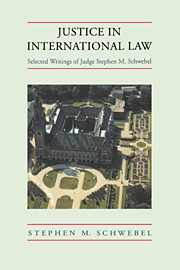Book contents
- Frontmatter
- Contents
- Preface
- PART I International Court of Justice
- 1 Reflections on the Role of the International Court of Justice
- 2 Relations Between the International Court of Justice and the United Nations
- 3 Was the Capacity to Request an Advisory Opinion Wider in the Permanent Court of International Justice than it is in the International Court of Justice?
- 4 Authorizing the Secretary-General of the United Nations to Request Advisory Opinions of the International Court of Justice
- 5 Preliminary Rulings by the International Court of Justice at the Instance of National Courts
- 6 Chambers of the International Court of Justice Formed for Particular Cases
- 7 Three Cases of Fact-Finding by the International Court of Justice
- 8 Indirect Aggression in the International Court
- 9 Human Rights in the World Court
- PART II International Arbitration
- PART III United Nations
- PART IV International Contracts and Expropriation
- PART V Aggression under, Compliance with, and Development of International Law
- List of publications
- Index
1 - Reflections on the Role of the International Court of Justice
Published online by Cambridge University Press: 06 November 2009
- Frontmatter
- Contents
- Preface
- PART I International Court of Justice
- 1 Reflections on the Role of the International Court of Justice
- 2 Relations Between the International Court of Justice and the United Nations
- 3 Was the Capacity to Request an Advisory Opinion Wider in the Permanent Court of International Justice than it is in the International Court of Justice?
- 4 Authorizing the Secretary-General of the United Nations to Request Advisory Opinions of the International Court of Justice
- 5 Preliminary Rulings by the International Court of Justice at the Instance of National Courts
- 6 Chambers of the International Court of Justice Formed for Particular Cases
- 7 Three Cases of Fact-Finding by the International Court of Justice
- 8 Indirect Aggression in the International Court
- 9 Human Rights in the World Court
- PART II International Arbitration
- PART III United Nations
- PART IV International Contracts and Expropriation
- PART V Aggression under, Compliance with, and Development of International Law
- List of publications
- Index
Summary
I greatly appreciate the privilege of giving the Jurisprudential Lecture this academic year at the University of Washington at the invitation of the Washington Law Review. It is a pleasure to return to this distinguished law school, which I visited years ago at the invitation of Professor Henderson. It is a particular pleasure for two reasons, apart from those of being at the University and revisiting Seattle. This occasion gives me the opportunity to see again one of my most valued former colleagues at the Office of the Legal Adviser of the Department of State, Professor Ted Stein. Professor Stein and I worked closely together in that great Office – perhaps the world's greatest office of the practice of public international law – in that happier day when the United States was plaintiff rather than defendant in the International Court of Justice – happier not of course for the imprisoned hostages; but I am sure you know what I mean when I use the word “happier.”
Another reason why it is a particular pleasure to speak is that I do so under Law Review auspices. I wonder how many of you appreciate how uniquely and refreshingly American is the institution of the law review. I refer not to legal journals, which are widespread throughout much of the world; I speak of law reviews, produced at law schools not by faculty but by students. Law reviews are remarkable instruments of legal scholarship, of legal education, and healthily American irreverence. The law review editor does not hesitate to edit whatever and whomever he or she can get his or her hands on.
- Type
- Chapter
- Information
- Justice in International LawSelected Writings, pp. 3 - 13Publisher: Cambridge University PressPrint publication year: 1994



